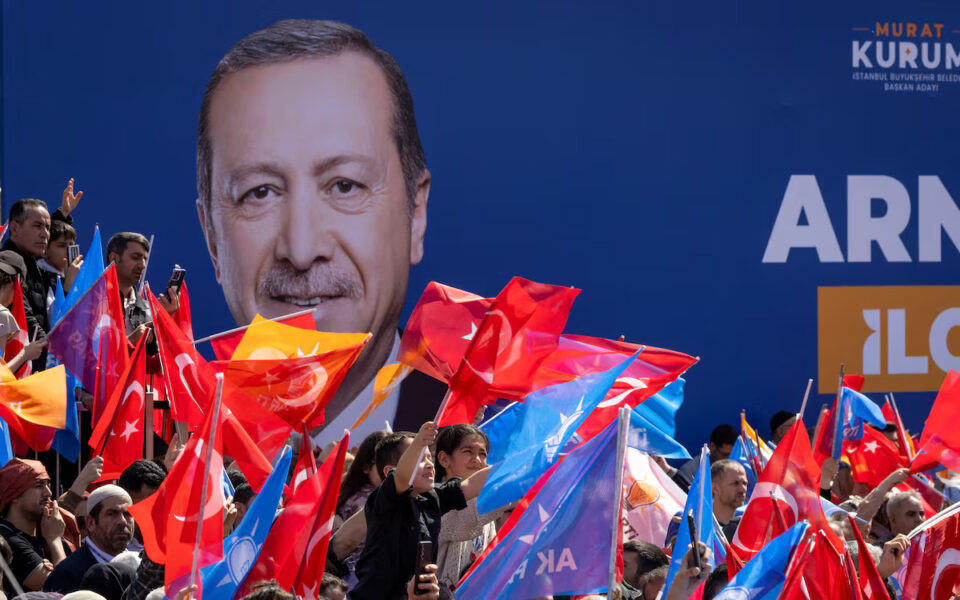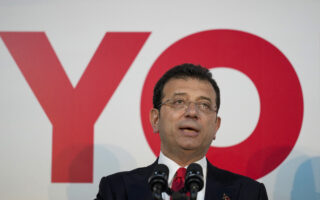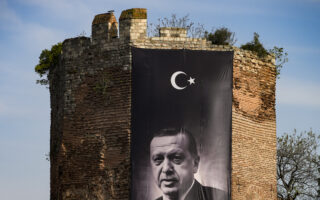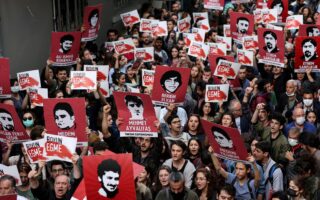A new day for Turkey? Analyzing the surprising results of the Turkish local elections

“Today is truly a historic day for Turkey, a rare day of hope for our democracy and a new day for our country’s political scene,” 29-year-old Can Bucak tells Kathimerini English Edition in the aftermath of Sunday’s local elections, his voice slightly cracking but still beaming with enthusiasm. The young architect is one of the thousands of citizens that gathered in Sarachane Park on Sunday night, outside Istanbul’s Town Hall, waving flags and banners and singing euphoric chants until the early hours of the morning, in celebration of a major victory for the Turkish opposition.
“The message voters sent yesterday is crystal-clear: Turkey is secular and will remain secular,” Bucak says, repeating one of the slogans that crowds were shouting on Sunday night as re-elected mayor Ekrem Imamoglu took the stage to address the country. “It is not simply about the municipalities that the opposition now controls, but about showing that there can actually be a political future outside of [Turkish President Recep Tayyip] Erdogan and the AKP’s dominance,” he adds.
Even for analysts far more reserved than the young and emboldened opposition supporter, Sunday’s local elections were nothing short of a political earthquake for Turkey. Never before during Erdogan’s decades-long iron grip over the country has the ruling Justice and Development Party (AKP) delivered such disappointing results. The governing party secured below 35.5% of Sunday’s vote, dropping to second place in the nationwide tally for the first time since its first victory in 2002 and losing control over a number of municipalities and local councils it used to rule.
In contrast, the elections were an unexpected triumph for the CHP, despite the party facing considerable challenges and distancing itself from the wider opposition alliance, which disintegrated following the defeat of its former head Kemal Kilicdaroglu in last year’s tense presidential race.
The main opposition party collected over 37.5% of the national vote, developing a comfortable lead ahead of its political rival and winning an electoral race for the first time since 1977. Its mayoral candidates delivered clear and impactful victories in the five biggest municipalities of Turkey – repeating landmark victories in Istanbul, Ankara and Izmir and further widening the gaps from their AKP challengers.
Most importantly, Sunday’s “red wave” expanded well beyond Turkey’s coastal regions and urban centers – which are considered traditional strongholds for the opposition – and took over more conservative Anatolian towns like Usak and Afyon. It is a remarkable development that challenges the assumption of the AKP’s natural dominance in central Anatolia, and one that suggests that support from the government has significantly weakened amid spiraling prices and nearly 70% inflation, the crumbling of the Turkish lira, and sluggish economic growth.
Though the most unexpected result was CHP exceeding all expectations in Anatolia, most eyes remained fixated in Istanbul, Turkey’s largest municipality, where the incumbent mayor Ekrem Imamoglu won by the biggest margin seen in the span of four decades.
Erdogan himself had clearly defined the city as the main battlefield of Sunday’s electoral race, by repeating multiple times that “nothing short of regaining control of Turkey’s biggest cities would be acceptable for the governing party.” But the Turkish president’s political goal was far from achieved, as the party’s candidate Murat Kurum – who some saw as a potential successor for the AKP’s leadership, should Erdogan follow through with his promised political retirement – severely underperformed in the polls.
On the other hand, the charismatic Istanbul mayor delivered another successful result, fully cementing his meteoric rise to center stage of Turkish politics. Speculation that Imamoglu may end up becoming the opposition candidate for Turkey’s next presidential elections further increased as he delivered his victory speech at the same time as Erdogan’s cautious concession speech, with multiple channels showing the two leaders simultaneously, drawing natural comparisons.
Sunday was also a phenomenal night for another CHP rising star, Ankara’s re-elected mayor Mansur Yavas, who won by a landslide that exceeded 25 percentage points, as well as for the party’s new leader Ozgur Ozel, who solidified his place at the head of the party. At a time when the AKP is struggling to cultivate a new generation of leaders that could inherit Erdogan’s popular legacy, the CHP seems to have abundant choices, while some analysts are also pointing out that after Sunday’s results the party will increase its resources through municipality funding and therefore be able to run more large-scale campaigns in the future.
Sunday’s shocking local elections also had ripple effects that extended beyond Turkey’s two biggest political parties. The center-right IYI Party, led by Meral Aksener, massively underperformed, falling short of 5% of the total vote – as did the ultra-nationalist MHP that is part of the governing coalition. In their place, the Islamist Yeniden Refah (New Welfare) collected a total of 6.2% of the vote and gained control of 56 electoral districts, emerging as the third most powerful political force in local administration.
The shifting political landscape that emerged after Turkey’s local elections has led to numerous diverging analyses by commentators. They unanimously agree that the result has undeniably emboldened the main opposition party, which now enjoys control over 14 metropolitan municipalities and 406 electoral districts, essentially taking charge of local administration in regions where more than 60% of the Turkish population resides.
Above all else, the results filled opposition supporters with optimism by showing that political change in Turkey remains a possibility, despite the AKP’s dominance in the political, institutional and media landscapes which has largely silenced dissent and criticism.
But some have already cautioned that the CHP’s victory may be dependent on the fact that Sunday’s elections were limited to local authorities, and therefore Erdogan supporters felt that they could express their criticism over the economy’s handling without massive consequences on the political scene. Others have pointed out that the opposition’s triumph was largely an outcome of Kurdish support, which is not necessarily a long-lasting development, while some commentators are also pointing to the surprising rise of Yeniden Refah to suggest that the true threat to AKP’s dominance over the Turkish political scene may end up coming from the nationalist or Islamic fringes.
For his part, speaking from the balcony of his party headquarters in Ankara, the Turkish president acknowledged defeat but assessed that Sunday’s results were “not an end, but rather a turning point” for the AKP and pledged to use the next four years before presidential elections to “renew ourselves and to compensate for our mistakes.”
It remains to be seen whether Erdogan’s promise refers to managing a successful reversal of Turkey’s economic outlook, or to a return to nationalist policies, polarizing rhetoric and further gagging of political dissent. In the meantime, one thing remains certain: Despite renewed hope and the possibility for change, the Turkish president is here to stay until 2028 – and four years is an exceptionally long time in politics, particularly in a country as politically fluid and full of surprises as Erdogan’s Turkey.





